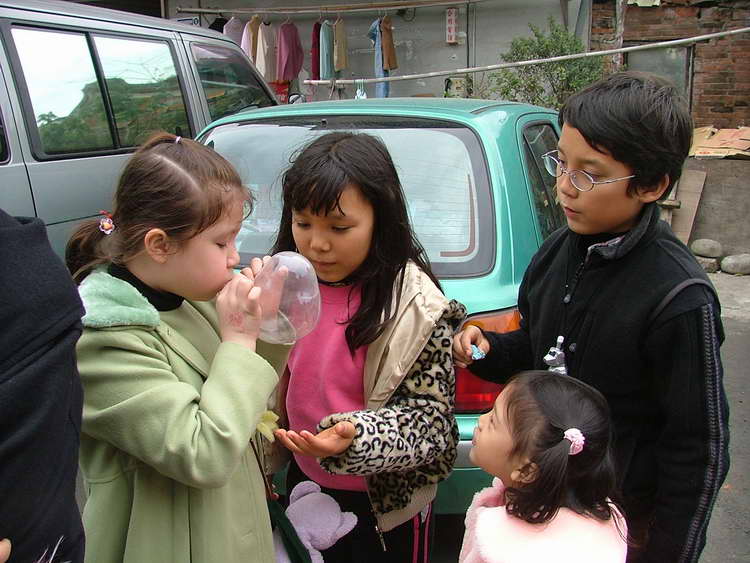 My wife, her sister Jessie (back
left), and my in-laws wait in the tiny train station at Chujung.
My wife, her sister Jessie (back
left), and my in-laws wait in the tiny train station at Chujung. 
Clearly the legislator for this district is not doing enough for the area's public infrastructure.

The tracks. The overpass in the background is the shiny new High Speed Rail line, a $13 billion boondoggle.

Your trusty author at the Chujung Train station.

My sister-in-law Sylvia, my wife's younger sister.

A local Taiwan dog, with the striking tiger-like coloration prevalent here.

The train was packed.

Jessie, one of my favorite people in the world.

The countryside whips by....

The countryside whips by....

The kids all enjoy a game on the train.

In Taiwan, everyone has the same vacation days, and they all go to the same places. The results are obvious.

A performer greets us as we debouch in Neiwan.

Neiwan town. My camera only displays 89% of the picture, so I frequently catch the tops of heads, like my wife's here.

A seller of mwa ji shows off his wares. These delectable desserts are made with sticky rice flour, stuffed with sweet fillings.

A close up view.

Zeb grabs lunch. Luckily sausage vendors are everywhere. Otherwise Zeb might be forced to try new foods. Oh, the horror!

Our restaurant was done up as a movie theatre from Taiwan of 40 years ago.

Everyone enjoys fine Hakka food.

Zeb enjoys the atmosphere, though not the food.

Stalls line the street as money leaps from your pocket into theirs.

Everything is sold in Neiwan.

A juice vendor.

Finally, something for the kids to do. Taiwanese amusements are decidedly dull for children.

Peter and his daughter Hongtz emerge from the crowd.

My in-laws watch the kids at play.

No place is so crowded that someone won't attempt to force a car through it.

An unidentified woman enjoys battered, deep-fried mushrooms.

Peter, my brother-in-law, buys snacks.

A Taiwan delight: various kinds of balls stuffed with sweet fillings and boiled until done. Served piping hot!

The cousins Aiwen, Hongtz, and Ting-an (Dan-dan) compare snacks.

What would Chinese New Year be without maimed and killed children from playing with fireworks unsupervised?

Zeb captures me on a Neiwan street.

Dan-dan with her new balloon.

The kids enjoy their balloon as we wait for the return train.

Playing a game on the way back.

And they're off! This being Chinese New Year, the roads to popular destinations are clogged.

After we find a parking space by divine intervention, mom, cousin Aiwen, and sister-in-law Sylvia head out.

Plenty of old buildings and shops to stimulate those of us with architectural interests.

Jessie and my mother-in-law marvel at the gigantic bowl and the grinding stick.

The kids pose with the equipment.

The inside of the shop had a nice authentic flavor.

The kids ready for the task at hand: make tea.

I went out into the street to take a few shots. Beipu's 19th century temple is the focus of the area's activities.

Meanwhile the family explores the shop.

A very traditional altar in a traditional home, with pictures of ancestors adorning the walls.

Peter talks shop with the shop-owner.

Zeb poses with the equipment and ingredients.

Everyone listens while we get directions on how to make the tea.

Dan-dan goes to work.

Snacks provided energy for grinding tea.

Dad lends a hand as cousin Aiwan pours in sesame seeds.

My father-in-law and Peter race, side-by-side.

Zeb gets in on the fun.

The result!

Hakka-style mwa ji, sticky rice flour cakes rolled in ground peanut.

Zeb poses with his little cousing Hongyu.

Meanwhile, out on the streets, its a madhouse.

Vendors everywhere.

Preserved stuff, a Hakka specialty.

The Temple was undergoing preservation and construction.

The interior of the Temple.

Here we snake behind the Temple to trek past the town's famous old buildings.

The inscription on the well reads "Built in the 14th year of the Showa Emperor" when Taiwan was a Japanese colony (1940).

Peter guides us around. He went to high school nearby and knows the area well.

An old house.

Examining an old house. Many movies and TV shows are shot here.

Another old house. Because some of these are lived in, visitors are not allowed to enter.

Taking a picture. Finally had everyone together. And everyone looking at the camera, almost. But there was one problem...

Another famous old building.

Finally.

Dried fruit for sale.

Outside of the touristy area, Beipu is just another sleepy mountain town.

The kids solve the problem of what to do.

Trekking to the last famous old house.